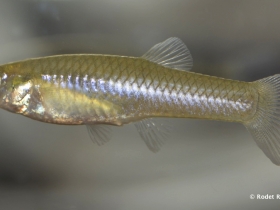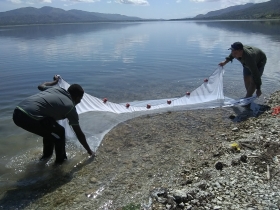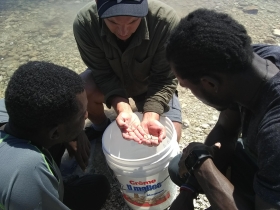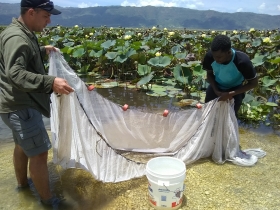[Caribaea Initiative Release Press] Haiti: Three Caribbean students join forces to discover a new species of fish
[Caribaea Initiative Release Press] Haiti: Three Caribbean students join forces to discover a new species of fish
Caribaea Initiative Release Press, 11 may 2020
Haiti: Three Caribbean students join forces to discover a new species of fish
'A team of three Caribbean students has just revealed the existence of a new species of freshwater fish endemic to Haiti. Limia mandibularis, named for its oversized jaw, was completely unknown up to now and only appears to exist in Lake Miragoâne, in the south-west of the country. This discovery, published online in the journal Zootaxa on 04 May 2020, has a particular impact when we consider that Haiti is one of the poorest countries in the world, and that its amazing biodiversity is eroding at an alarming rate. The story of the discovery deserves to be heard. Rodet Rodriguez-Silva is Cuban, Patricia Torres-Pineda is from the Dominican Republic, and James Josaphat was born across the border, in Haiti. All three are fascinated by the study of the aquatic fauna of the Greater Antilles. It was high time these three Caribbean students joined forces! The project came to fruition in the Dominican Republic in May 2019, during the fourth edition of the Caribaea Initiative Research & Conservation Conference (CIRCC). This annual meeting is an ideal setting for networking and development of new collaborations spanning the Caribbean islands. All three scientists attended CIRCC 2019 as guests of the non-profit organisation Caribaea Initiative*. A month later, and with the enthusiastic support of Caribaea Initiative, the three students organised a field trip to Lake Miragoâne in Haiti. The lake is known to be an exceptional site for endemic Limia species, but few scientific investigations have been possible here as a result of the conditions prevailing in the country. The students took up the challenge and had happy fishing. They caught a small fish that was remarkable due to its highly-developed lower jaw, the result of an elongated anguloarticular bone. A full morphological analysis confirmed that it was indeed a new species of fish. Thus, Limia mandibularis (from the Latin mandibular meaning “jaw”) was revealed to the world. Species in the Limia genus have the particularity of being ovoviviparous, meaning that the mother gives birth to fully-formed offspring. This reproductive mode is quite rare in fish. 2/4 The discovery of a new vertebrate species by this young Caribbean team is all the more remarkable as this type of discovery is rare, maybe even exceptional. The three students are already preparing their next article, which they hope to publish at the end of the year, presenting all the ovoviviparous fish endemic to Lake Miragoâne, with descriptions of each species to allow rapid identification in the field. This article will also shed light on some threats to the conservation of the lake’s aquatic biodiversity. Thanks to this early success, James Josaphat was accepted to a PhD programme at the University of the West Indies, to work on a project to better understand the mechanisms behind diversification of fish in the Limia species in Lake Miragoâne and to ensure their preservation. As yet, no specific protective measures have been implemented at this exceptional site.
Reference
Rodriguez-Silva, Rodet, Patricia Torres-Pineda & James Josaphat. 2020. Limia mandibularis, a new livebearing fish (Cyprinodontiformes: Poeciliidae) from Lake Miragoane, Haiti. Zootaxa 4768(3) : 395–404.
DOI : 10.11646/zootaxa.4768.3.6
*James Josaphat is starting a PhD, funded by Caribaea Initiative. He is studying at the University of the French West Indies, Guadeloupe cluster, co-directed by Dr. Etienne Bezault, Laboratoire Borea (MNHN, CNRS FRE 2030, SU, IRD 207, UCN, University of the French West Indies) and Pr. Ingo Schlupp, University of Oklahoma. His research project is “Factors affecting the diversity of communities of ovoviviparous fish in the Limia genus (Poeciliidae) in Haitian freshwater courses”.
Rodet Rodriguez-Silva is scheduled to finish his PhD next year at the University of Oklahoma where he is working under the direction of Dr. Ingo Schlupp. His research project is focused on the ecological mechanisms influencing speciation in ovoviviparous fish is the Greater Antilles. Caribaea Initiative has provided part of his research funding since 2019.
Patricia Torres-Pineda is a research assistant and curator of the fish collection at the “Prof. Eugenio de Jesús Marcano” National Museum of Natural History in the Dominican Republic. At the start of the next academic year, Patricia will enrol in a Master’s in ecology and evolutionary biology at the University of Michigan. Patricia is particularly interested in the ecology of freshwater fish..






